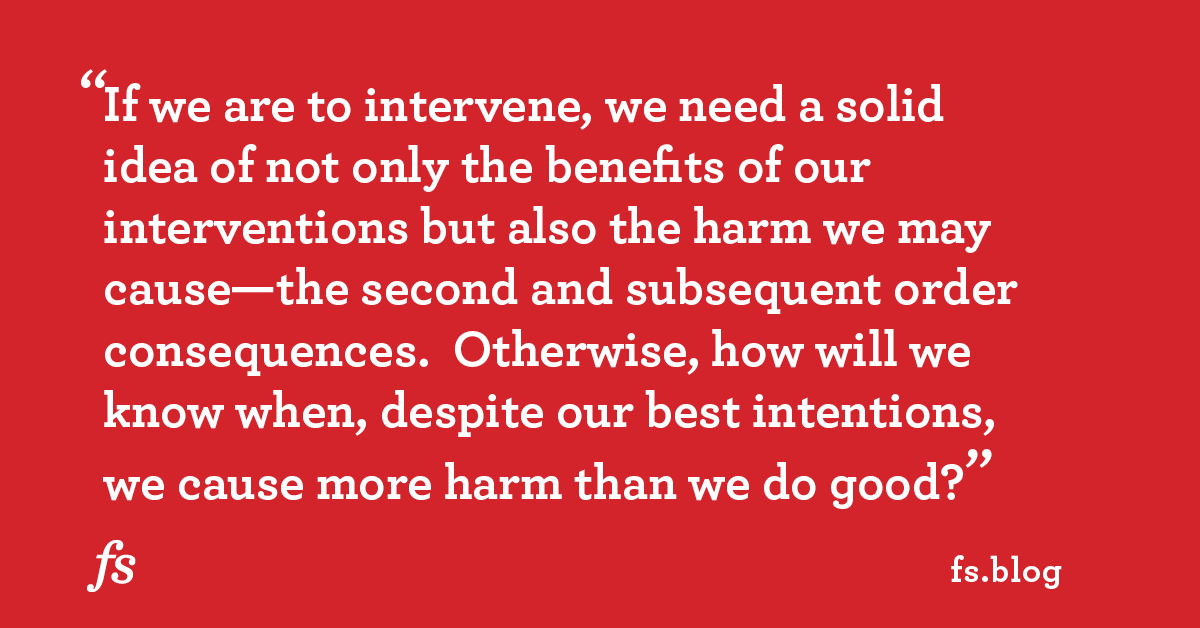Iatrogenics - How Good Intentions Can lead to Bad Results ⚕️
When should we act and when should we NOT?

iatros means healer in Greek.
Iatrogenics means "Damage done by the Healer". The healer may be a doctor, or any decision-maker intervening to solve a problem (CEO, Politician, Engineer, etc).
This definition begs the question, when should we allow intervention to solve a problem, and when should we do nothing instead to have the problem fixed?
When to Intervene
How to bypass our "Do Something Syndrome"
Our societies have a bias for action. The "Do Something Syndrome". We've completely forgotten about ancient philosophies such as Wu Wei, and even more recent battle strategies that worked precisely due to avoidance of action, such as the Fabian Strategy.
And all this has devolved into Positive Intervention as the only possible intervention to solve a problem.
The issue with Positive Intervention
A great example of iatrogenics in action is the death of George Washington. In 1799, as he lay dying from a bacterial infection, his well-intentioned doctors aided or hastened his death using the standard treatment at the time, which was bloodletting (at least five pints, according to Ron Chernow).
Sometimes doing nothing is the best course of action, and ironically, the fastest to solve a problem.
So we must always ask...
When to Intervene Then?
We need a solid grasp on the benefits of the intervention, and the harm we may cause (on second or other order consequences). But most importantly, we should avoid any situation that might cause Iatrogenics.
Here's a useful table to refer to by Nassim Nicholas Taleb on his website:

What Causes Iatrogenics?
A tale of good intentions causing damage
Most well-intentioned people fail to help with a problem due to 4 different reasons.
1 - Not thinking through second and subsequent order consequences.
Creating a dam to help a city might do just that, but also kill important fauna near city 2, and in turn, cripple hunting businesses in city 2. City 3 then stops getting enough food for its citizens.
2 - Distance from Consequences
Two possible ways to be distanced from the consequences of the actions you take:
- Time: There is too much time between taking a course of action and actually seeing the results. This in turn makes it unlikely that we ever see evidence contradicting our beliefs.
- Actual distance: Think of every politician creating laws on things they have no direct contact with, and won't ever see that law applied to themselves.
3 - Bias for Action
Our society only sees possible solutions to problems by DOING things, and never by observing, waiting, or delaying decisions.
Charlie Munger famously coined the term do something syndrome. He said it arises in situations when "You’re expected to have an opinion on everything".
4 - No Skin in the Game
We touched on this a bit on point 2, it's when you won't feel the consequences if things go wrong but will get credit when they go right.
That creates a bias for DOING stuff since you are protected from any downsides from your decisions while getting all the visibility for when it succeeds.
Some parting thoughts
The Hippocratic oath states:
era-primum non nocere
At first, do no harm.
And secondly:
“Muddy water is best cleared by leaving it alone.” - Alan Watts
Rarely do we consider the cost of doing something might outweigh its benefits. That is accentuated when you're in situations where you're expected to be doing something, even if the costs of action are high.
Next on we'll be tackling how to position yourself in a place where you take advantage of intervention when it happens and when it doesn't.
😗 Enjoy my writing?
If you read more than 2 of my posts and loved them, we have an honor code, meaning I give you value and you hit that subscribe button.
It's an honor code because I can't force you to do that, nor will I know if you don't, I trust you keep your end of the bargain and I will keep my end by continuing to publish weekly posts that bring value to you ;).
Feel free to Buy me a Coffee ☕.
Forward to a friend and let them know where they can subscribe (hint: it’s here).
Join an Exclusive Tech Friendly Community! Connect with like-minded people who are interested in tech, design, startups, and growing online — apply here.
Resources






